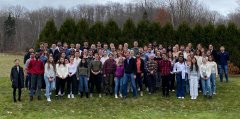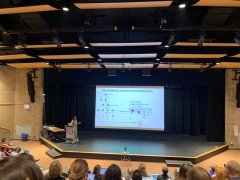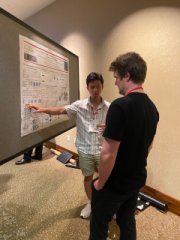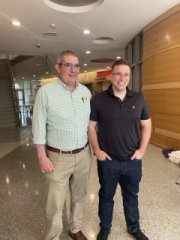News & Announcements
Parag Juvale PhD Thesis Defense
Parag Juvale PhD Thesis Defense
Title: "Postsynaptic Changes in Inhibitory Signaling are not Necessary for Experience-Dependent Maintenance of the Visual System"
Advisor: Sarah Pallas
December 20, at 12 pm
Location: Room 222, Morrill
Olivia Macrorie MS Thesis defense
Olivia Macrorie MS Thesis defense
Title: Investigating the role of Got2 in murine organogenesis and placental development
Advisor: Kimberly D Tremblay
Monday December 18 at 1pm in ISB 221
Christine Otfinoski PhD Dissertation Defense
Christine Otfinoski PhD Dissertation Defense
Title: Visual experience is necessary for maintenance but not development of lateral inhibition in superior colliculus
Advisor: Sarah Pallas
November 20th at 11:15am
Morrill 2 222
Hyuna Kim's PhD defense
Hyuna Kim's PhD defense
Studies on Breast Cancer Dormancy Using Cell Lineage Tree Approach and Tissue-Mimicking Hydrogels
Shelly Peyton's lab
August 30, 1pm
LSL N410
MCB PhD candidate Saman Nayyab selected to give a talk at the GRC Fertilization and Activation of Development
MCB PhD candidate Saman Nayyab selected to give a talk at the GRC Fertilization and Activation of Development
Saman was selected to give a 10-minute talk at the Gordon Research Conference: Fertilization and Activation of Development in Holderness, NH, after presenting her poster "Characterization of TSSK1, TSSK2, and TSSK3 as potential targets for male contraception". This was her very first talk at a conference — way to go, Saman!
Samantha Schultz successfully defended her Masters Thesis work
Samantha Schultz successfully defended her Masters Thesis work
“Combining Simulation and the MspA Nanopore to Study p53 Dynamics and Interactions”
Advisors: Jianhan Chen and Min Chen
Tom Scudder received his Masters degree
Tom Scudder received his Masters degree
Tom uncovered critical determinants that govern the regulated delivery of protease substrates needed for driving the bacterial cell cycle.
Advisor: Peter Chien
Bao Nguyen won a Protein Society Symposium Poster Award
Bao Nguyen won a Protein Society Symposium Poster Award
Congratulations Bao Nguyen from Meg Stratton's lab for winning Graduate Poster award from the Protein Society Symposium 37. The awardees were selected among 250+ posters.
Nathan Canniff successfully defended his PhD work
Nathan Canniff successfully defended his PhD work
Nathan has done a beautiful job characterizing and dissecting the role of TTC17 in human secretory pathway protein trafficking. He has used an impressive array of genetic, biochemical, molecular biological, cell biological, computational and quantitative mass spectrometry approaches.
"A novel ER adapter protein TTC17 mediates protein trafficking in the endoplasmic reticulum"
Advisor: Daniel Hebert



